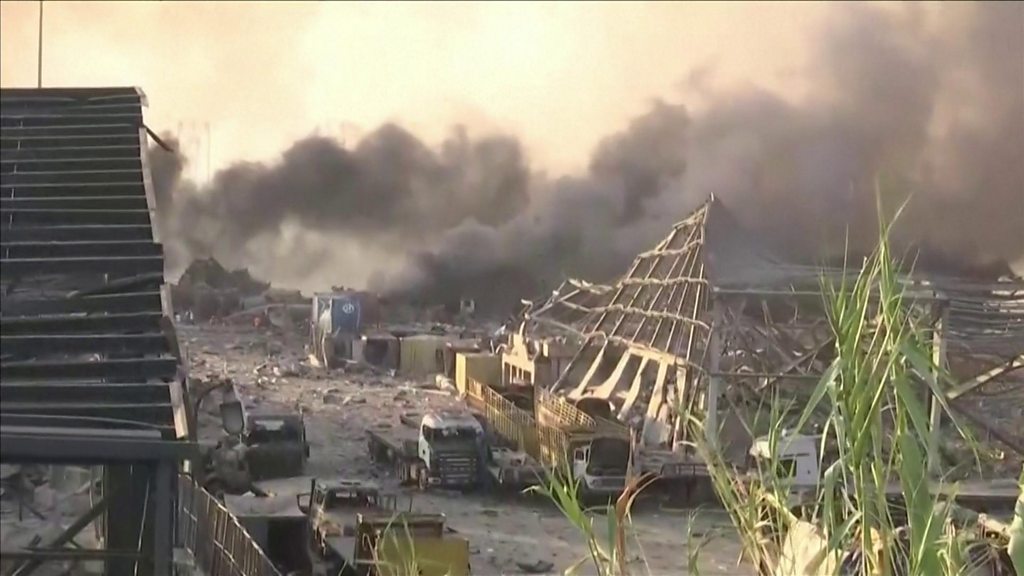
Media playback is unsupported on your device
A large blast has hit the Lebanese capital, Beirut, causing widespread damage and injuring many people, officials say.
It is not yet clear what caused the explosion in the port area of the city. Video posted online showed a large mushroom cloud and destroyed buildings.
Hospitals are said to be overwhelmed by casualties.
It comes at a sensitive time with the country's economic collapse reigniting old tensions.
Tensions are also high ahead of the verdict in a trial over the killing of ex-PM Rafik Hariri in 2005. A UN tribunal is due to issue its verdict in the trial of four suspects in the murder by car bomb of Hariri on Friday.
Lebanon's health minister, Hamad Hasan, has spoken of many injuries and extensive damage.
Reuters news agency quotes sources as saying 10 bodies have been pulled from the wreckage.
The cause of the explosion is still not known, but some reports suggest it may have been an accident. Lebanon's National News Agency reported a fire breaking out at what it called an explosives depot at the port.
Local media showed people trapped beneath rubble. A witness described the first explosion as deafening. Video footage showed wrecked cars and blast-damaged buildings.
The latest reports come amid political tension in Lebanon, with street demonstrations against the government's handling the worst economic crisis since the 1975-1990 civil war.
There has also been tension on the border with Israel, which said last week that it had thwarted an attempt by Hezbollah to infiltrate Israeli territory.
'Glass going down from all over the building'
Hadi Nasrallah, eyewitness speaking to the BBC
I saw the fire, but I didn't yet know there was going to be an explosion. We went inside. Suddenly I lost my hearing because apparently I was too close. I lost my hearing for a few seconds, I knew something was wrong.
And then suddenly the glass just shattered all over the car, the cars around us, the shops, the stores, the buildings. Just glass going down from all over the building.
Literally all over Beirut, people were calling each other from different areas kilometres away and they were experiencing the same thing: broken glass, buildings shaking, a loud explosion.
Actually we were shocked because usually when it happens, just one area will experience those happenings after an explosion, but this time it was all of Beirut, even areas outside of Beirut.
Shock and anxiety
By Sebastian Usher, BBC Arab affairs analyst
The videos and images not just of the massive cloud of smoke erupting in Beirut but the damage and devastation it's caused kilometres away have triggered a new wave of shock and anxiety in Lebanon, which is already teetering on the brink of a catastrophic economic collapse.
Just hours before the blast, anti-government protesters had been scuffling with the security forces outside the ministry of energy, demanding yet again accountability from the country's leaders.
There have been grave warnings of hunger in the streets or a reigniting of sectarian conflict if the economy worsens.
And the blast will remind many of the bomb that killed Rafik Hariri. The Lebanese will be hoping that this latest blast will remain a human tragedy - an accident - and not a premeditated act.
What's the Hariri case about?
On the morning of 14 February 2005, Rafik Hariri - then an MP who aligned himself with the opposition in parliament - was travelling in a motorcade when the explosion went off in a busy area full of hotels and banks, causing widespread damage.
Mr Hariri had been one of Lebanon's most prominent Sunni politicians and, at the time of his death, had joined calls for Syria to withdraw troops which had been in Lebanon since 1976 following the start of the civil war.
The killing brought tens of thousands of demonstrators on to the streets in protest against the pro-Syrian government, with the finger of blame for the assassination pointed at Lebanon's heavily influential neighbour.
Within two weeks the government resigned and weeks after that, Syria withdrew its forces.
After collecting evidence, the UN and Lebanon set up the Special Tribunal for Lebanon (STL) in The Hague in 2007 to investigate the bombing, and ultimately charged four suspects of the Iranian-backed Hezbollah group with terrorism, murder and attempted murder.
A fifth man linked to the attack, Hezbollah military commander Mustafa Amine Badreddine, was killed in Syria in 2016.
Hezbollah's supporters have dismissed the trial, suggesting that the STL process is not politically neutral.
Are you in Beirut? Have you been affected by the blast? If it is safe for you to do so, please email haveyoursay@bbc.co.uk.
Please include a contact number if you are willing to speak to a BBC journalist. You can also contact us in the following ways:
https://news.google.com/__i/rss/rd/articles/CBMiNWh0dHBzOi8vd3d3LmJiYy5jby51ay9uZXdzL3dvcmxkLW1pZGRsZS1lYXN0LTUzNjU2MjIw0gE5aHR0cHM6Ly93d3cuYmJjLmNvLnVrL25ld3MvYW1wL3dvcmxkLW1pZGRsZS1lYXN0LTUzNjU2MjIw?oc=5
2020-08-04 16:30:00Z
52780977315550
Tidak ada komentar:
Posting Komentar